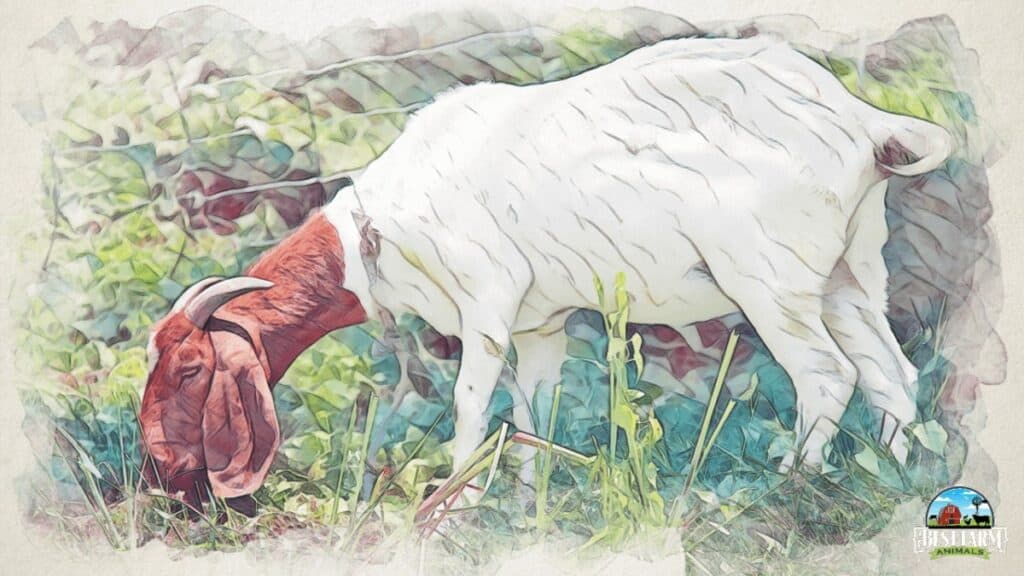Goats have a reputation for eating all kinds of things. But, when they eat dirt, many goat owners wonder why. Known as pica, eating dirt, rocks, or other inedible items is unusual in various animals, including baby goats.
It affects goats of all ages and breeds and can happen in all parts of the world. Pica affects other animals, including pigs and sheep. While the act of pica itself is generally harmless, this behavior is unsightly and could be caused by underlying health issues.
In this article:

Why do goats eat dirt? Goats eat dirt as an instinct to solve health issues. The most common reason they lick dirt is to make up for a mineral deficiency in their diet. Even baby goats tend to eat dirt, mud, or chew rocks. The goat often attempts to balance their sodium, copper, or selenium intake. These three minerals occur naturally worldwide in different concentrations within the soil and plants.
Some regions contain an abundance of one or more of these minerals, while other areas are severely lacking. In rarer cases, parasites, habits, or illnesses can induce a goat to eat dirt.
Let’s dive in so you can figure out what’s causing your goat to eat dirt.
Pica in Goats
Goat pica is when goats eat dirt, rocks, and wood or chew at odd items such as tin cans, fence posts, or housing. It is not normal for goats to chew at everything- goats can be quite picky eaters. If goats have an underlying issue- they can and will eat almost anything.
Treating Goat Pica usually requires making sure that your goats have enough phosphorus and other critical minerals in their diet. Goats should be given loose minerals that they can eat and absorb better. If goats still exhibit pica, the next step is to check them for worms and other parasites that may be stealing nutrients from their diet. There are other steps you can take to treat pica in goats so let’s dive into the causes and treatments.
6 Reasons Why Goats Eat Dirt
Eating dirt, mud, rocks, or even sand is an unusual goat-eating behavior. Goats eat dirt because a natural instinct drives them to seek a solution.
Usually, a goat licks the soil because it has either a mineral deficiency, parasite overload, or another health issue. Sometimes, boredom or shedding can cause goats to lick the soil. Goats will often try to self-medicate when something is wrong, so if you notice your goat licking dirt- take the time to observe how frequently it happens so you can correct a health imbalance.
It is not normal for goats to eat dirt. Healthy goats will not eat dirt, although many a old farmer belief that it is normal. If your goat chews on dirt, it is probably low on a critical nutrient or facing another health crisis.
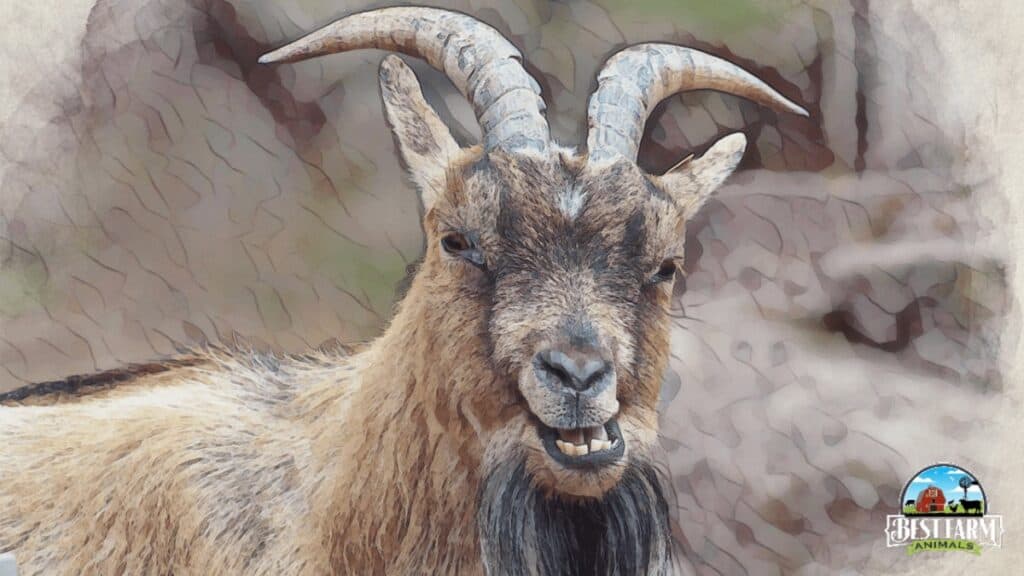
1. A Mineral Deficiency Causes Goat Pica (Dirt eating)
A goat that’s eating something that isn’t considered as edible food might be suffering from pica, which is an eating disorder. Most of the United States has a selenium deficiency in the soil. This has not caused health issues for wild goats or sheep because they can cover huge distances to find the minerals they need.
However, since domestic goats are confined to much smaller areas than their wild relatives, they cannot naturally browse on enough bushes and shrubs to fill their need for these minerals.
If all minerals and vitamins are provided, and your goats have had plenty of time for their bodies to reflect the nutritional changes, the act of eating dirt should stop. If not, it could be related to other issues in your herd, including internal parasites and learned behaviors.
Treating Goat Pica from a Mineral Deficiency: Goats with a mineral deficiency should be provided with free-choice minerals so they can eat as much minerals as they need.
2. Internal Parasites Cause Mineral Deficiencies
Internal parasites can also be a concern for goats eating dirt. Worms in a goat’s intestines may cause them to eat soil or rocks in an attempt to rid themselves of the parasites.
Additionally, goats that do eat dirt may also ingest their droppings or droppings from another goat adding to the internal parasites. If you notice your goat eating dirt or rocks, always check for any signs of internal parasites and treat that as necessary.
Treating Pica caused by Internal Parasites: Make sure you rid your goats of worms. Check out this article to find out more about goat vaccinations and dewormers.
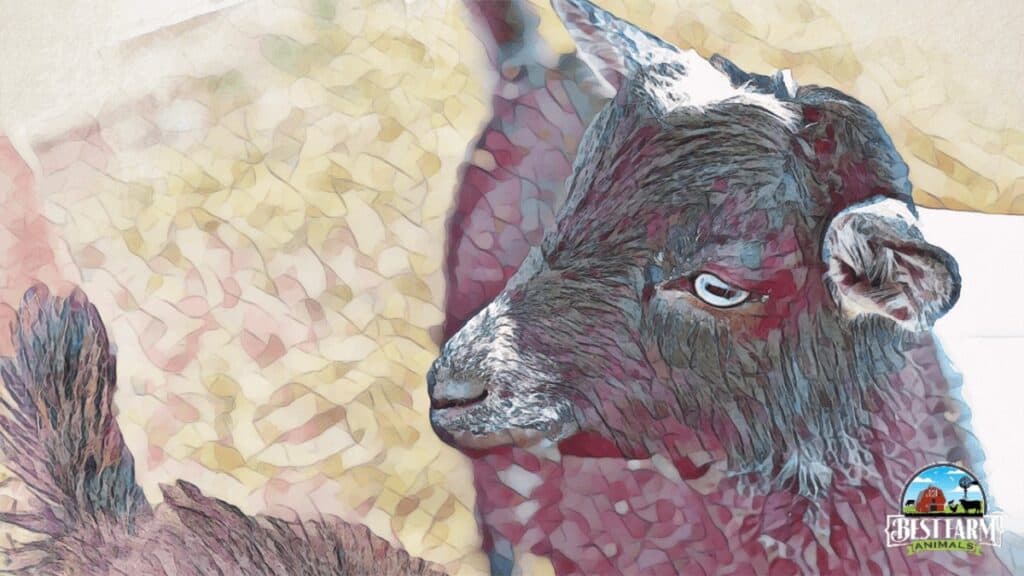
3. Your Goats are Bored When They Bite Rocks
Goats may sometimes develop bad habits out of boredom or stress. This has been known to include pacing, repeatedly butting the wall with their head chewing on rocks.
A change of scenery, something to play with,or a toy, such as a ball or climbing toy, may help improve their mental state and stop eating dirt or rocks entirely.
4. Goats Eat Mud or Rocks When Shedding
You may notice some goats start eating rocks and soil when shedding their winter coats. If this is a new and only occasional behavior, they may need a boost in copper.
This mineral is directly related to coat health and hair growth, so if you only ever notice this behavior during the shedding months, a boost of copper may be necessary.
5. Compromised Health Status Makes Your Goat Bite on Things
Goats that have been sick and are now recovering, as well as baby goats still nursing or being bottle-fed, may also turn to eat dirt or mud in an attempt to restart their gut flora and beneficial bacteria. This may carry more risks for the goat as internal parasites, botulism, and other bacterial issues may arise.
If your goat has been off-feed or is just starting to develop its intestinal flora, contact your veterinarian or local farm store to ask about probiotics for your goats. Providing your goat with the right boost of healthy bacteria can quickly put a stop to pica in this case.
6. Well Water Can Contribute to Deficiencies
Most rural areas that have goats also obtain their water from a well. The well water often contains different iron, calcium, or sulfur concentrations. These minerals are sometimes in such high concentrations that it can prevent your goats from absorbing the micronutrients they need, leading them to be continuously deficient even if the proper balance of minerals is always provided.
High calcium levels in water sources can bind to selenium in the goats’ system, preventing it from being absorbed by the goat properly. This leads to selenium deficiency and infertility and general health issues in your herd.
Contacting your local Health Agency or University to have your well water tested is a highly reliable and straightforward way to know exactly what minerals your water may contain. Once you know this, you can adjust the nutrients in your loose minerals and supplement your herd as needed.
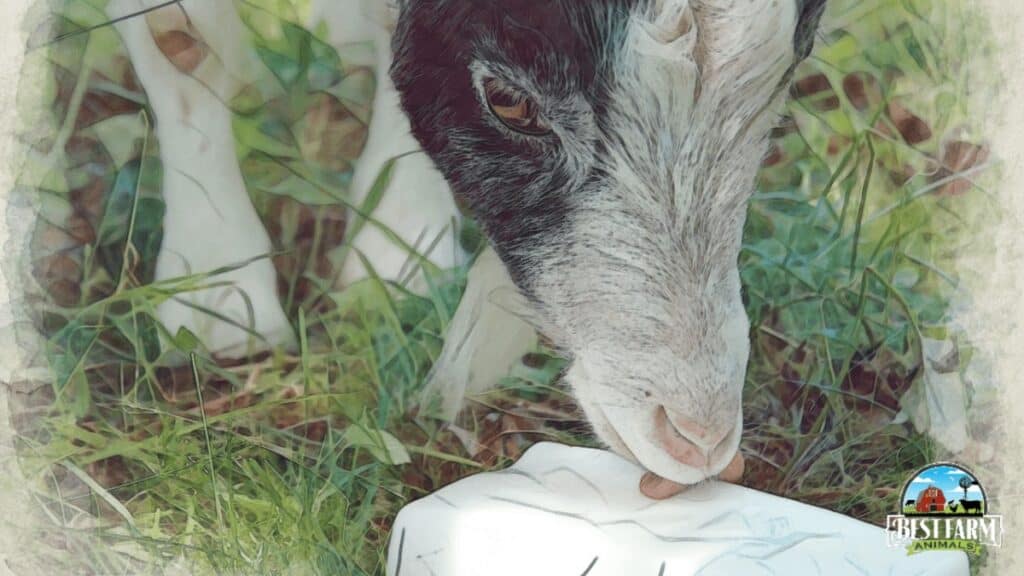
Mineral Blocks for Goats: 7 Minerals Goats Need
Regardless of their breed or intended uses, a wide range of macro and micronutrients are vital for domestic goats to have in their diet. Ensuring your goats are getting the proper amount of these minerals is equally as important as them having access to the minerals in the first place.
Most nutrients are given to goats in loose grit form rather than as a mineral block. This allows the goat to easily self-regulate their intake daily. The three most important minerals for domestic goats are:
1. Selenium
This mineral is essential for the reproductive health of your herd. Deficiencies in selenium can cause weak libido and infertility in bucks, miscarriages and spontaneous abortions in does, and weak joints in both adults and kids. Additionally, white muscle disease has directly been related to selenium deficiency and has become a severe issue in some parts of the United States.
Ensuring your goat mineral mix has up to 80 ppm of selenium is extremely important. It is recommended to never go below 20 ppm, especially in herds used for breeding purposes. You can give goats with severe selenium deficiencies oral supplements to boost their selenium intake quickly.
2. Copper
The deficiency of this mineral is responsible for a wide range of issues in goats. Some of the minor signs of copper deficiency can include dull coat, wiry coat, discolored coat, increased susceptibility to both internal and external parasites, and anemia, which may cause death if not treated.
You should always try to find a mineral mixture with 1500-2000 ppm of copper. If you cannot find this amount, additional copper supplementation may be required with injections or oral pastes.
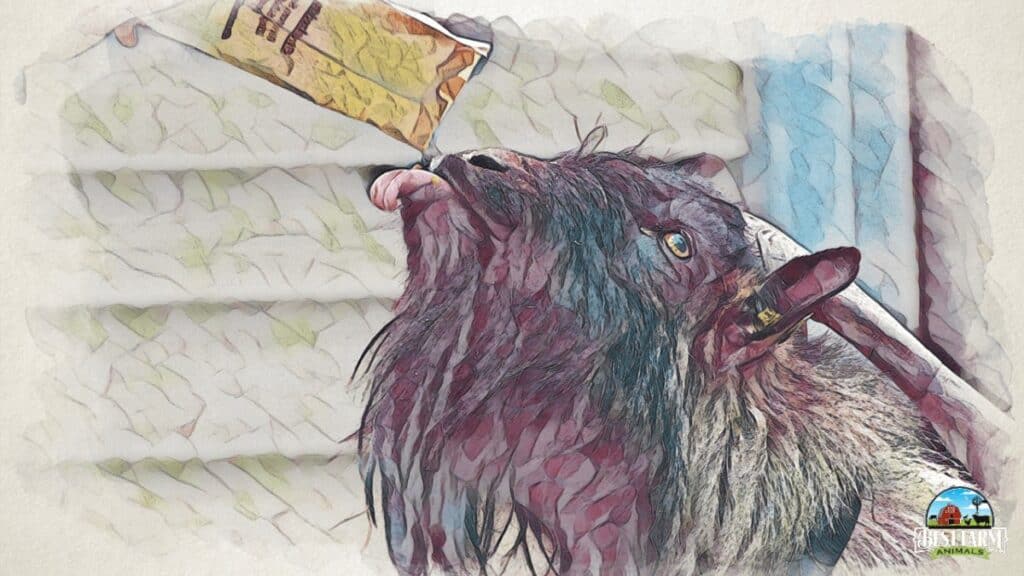
3. Zinc
Like copper, zinc deficiencies can be linked to a wide range of issues in your herd. Some of the most apparent signs of a zinc deficiency include poor skin condition, poor hoof health, infertility in both bucks and does, increased susceptibility to external parasites, and joint issues in goats of all ages.
Your mineral mix needs to include zinc at a rate 3 or 4 times higher than the copper content. For example, compounds with 2000 ppm of copper would need to contain 6000-8000 ppm of zinc. This balance helps ensure proper nutrient absorption by the goats.
Additional minerals for proper goat health may include:
4. Iron
Iron is usually not a problem in goats with access to pasture and diverse roughage. However, iron deficiency may become an issue if you raise market goats in confinement. Some signs of iron deficiency include poor respiration rates, poor heart rate, weakness after physical exertion, and severe anemia that may be fatal if not treated.
Iron in most loose mineral mixes can range anywhere from 50 to 1000 ppm. The amount you get will depend on whether you want to prevent an iron deficiency or are treating one. Iron injections and oral supplementation can also be provided in a goat mineral mix containing this nutrient.
5. Calcium
In addition to helping goats build strong bones and promote nerve health, calcium is also essential for lactating females. Calcium deficiency can lower milk production, increase the risk of milk fever, and cause weak uterine contractions in breeding females. Additionally, kids born from calcium-deficient females may have bone weakness and cannot stand and nurse properly.
The calcium percentage should range from 14% to 18%, depending on the brand of goat minerals you purchase. Calcium percentages on the lower end are highly recommended for bucks and wethers due to the potential risk of urinary calculi.
6. Phosphorus
Phosphorus is essential to have in your mineral mix as it helps the goat properly absorb calcium. Typically phosphorus should be included at twice the amount of calcium. For example, if your goat mineral mixture has 15% calcium, you should ensure that your phosphorus amount is around 30%.
This mineral is crucial for calcium absorption, but a phosphorus deficiency can directly relate to pica in your herd. Goats may attempt to eat wood, stones, clay, and dirt to compensate for this diet deprivation without proper mineral access. Additionally, symptoms of phosphorus deficiency include poor coat condition, poor fertility, and physical weakness.
What are the symptoms of a phosphorus deficiency in goats?
The most common symptoms of a goat’s phosphorus deficiency include slowed growth rates, pica (eating soil and rocks), lowered fertility, a dull coat, and listlessness. Goats might also experience a loss of appetite.
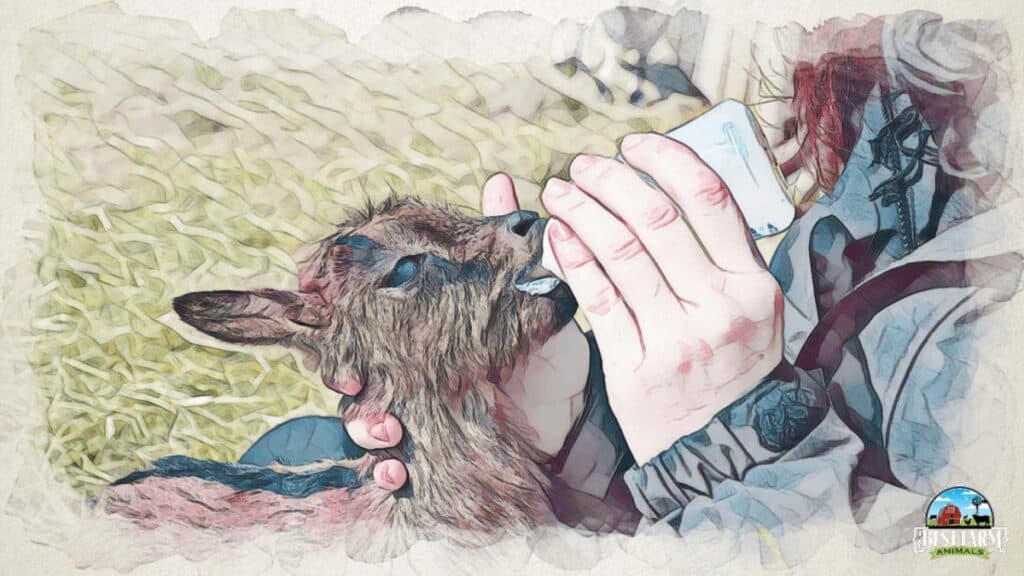
7. Salt
Generally provided as a way to make minerals more palatable for goats, your loose mineral salt content needs to be less than 20%. If the mixture contains too little salt, the goats may keep eating to the point they get a mineral overdose. If the salt content is too much, they may stop eating before getting the right balance of minerals.
Salt consists of both sodium and chloride, which act as electrolytes in your goat’s body. Proper electrolyte balance improves water movement throughout the body, pH balance within the body, and nerve health. Deficiencies in sodium and chloride may include nerve damage, muscle weakness or stiffness, poor appetite, urinary calculi, or pica.
Is a Loose Minerals or a Mineral Block Better?
There are two ways you can offer goat minerals. Some minerals come in block or brick form, and others come in loose mineral or grit form. Both options can contain the same amount of nutrients to keep your goats healthy, but most goat owners choose one over the other.
Mineral blocks are a tightly compacted and tough item you place in your goat barn or pasture. This allows them to lick and chew on the minerals when they want. However, most goat owners stay away from the mineral blocks as it is too tricky for goats to get enough nutrients from licking alone.
Goats have very soft tongues and are generally unable to lick enough from the blocks to meet their daily requirements. Additionally, as they only have bottom teeth in the front of their jaws, it makes it very hard for them to chew on the rock-hard blocks adequately.
Most goat owners recommend loose minerals. Goats are excellent at self-regulating their daily intake of nutrients. Having the loose minerals available in a separate feeding container around the clock is the best way to ensure your goats meet their nutritional needs.
Additionally, you may choose to top-dress grain or other food items. Unfortunately, much of the nutritional balance is lost as the goats will sometimes not eat enough of the minerals they need for the day when their feed is top-dressed. Overall, most goat owners maintain the best method is to place loose minerals in a separate feeding bowl and ensure it is offered free choice to your goats around the clock.
Regardless of which method you choose to go with, always ensure your minerals are specifically formulated for goats. Sheep formulas or sheep & goat mixtures will not contain enough copper to keep your goats healthy. Also, be sure to take note of the salt or sodium content in a loose mineral. Anything over 20% is too much, and your goats may stop eating the minerals before meeting their daily needs.
Tooth Damage in Goats That Eat Dirt
Once changes are made to your goat’s diet, it may take some time for them to stop eating dirt, rocks, sand, or other non-food items. You might worry about their dental health since eating rocks can’t possibly be healthy for their teeth. This is a valid concern since, as ruminants, goats will process their food multiple times by regurgitating coarse food and chewing on it numerous times throughout the day to break it down even further.
Luckily for your goat’s teeth, the lower chamber of the stomach is where the stones and clumps of dirt will end up. This is also where the most processed food goes. This means they will not be regurgitating food from this stomach chamber, so there is little to no risk of chewing their cud and damaging a tooth on a stone.
Additionally, once the food is in this final stomach chamber, it is ready for processing by the body. Nutrients are sent where they need to go, and the rest is passed as droppings. You may notice small pebbles and other inedible items in dirt-eating goats’ feces.
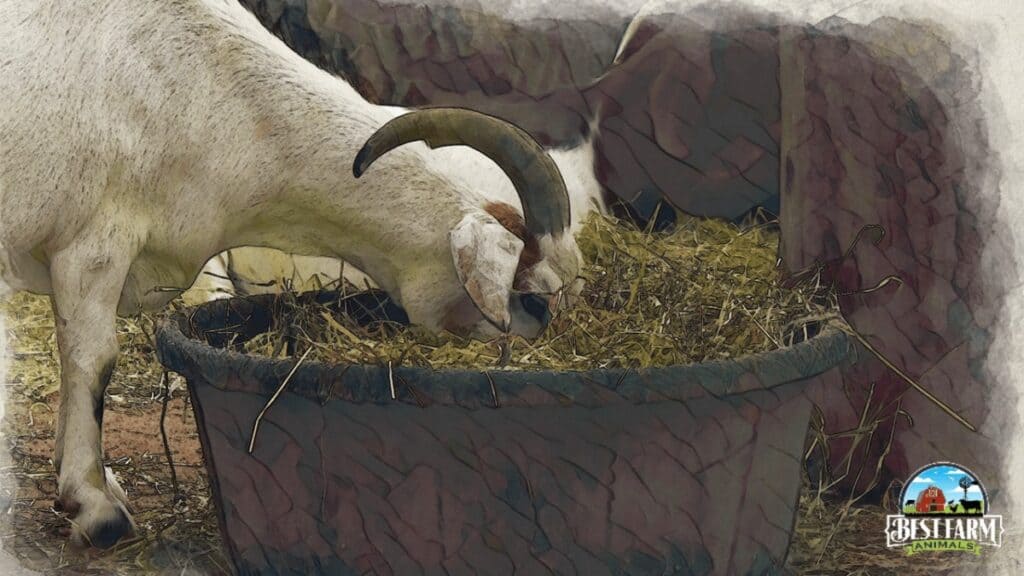
Is Sand Good For Goats?
There are a few things to take into account when using sand as goat bedding. Sand has fewer upkeep requirements and requires less frequent replacement than other bedding materials like stall freshener or lime wash, despite not being as absorbent.
Sand can take a while to dry out, which could create a moist environment that attracts bacteria and parasites and endangers the goats’ health. Sand bedding needs to be cleaned and checked regularly to ensure it stays dry and clean for the goats’ welfare.
Furthermore, goats’ lungs are delicate, and the ammonia resulting from their urination can be toxic. To keep the area tidy and avoid ammonia buildup, goat feces may need to be scooped daily when using sand as bedding. Proper ventilation and good sanitation practices, including routine cleaning and maintenance of sand bedding, are crucial to provide a healthy environment for goats.
Sand can be used as goat bedding, but it’s important to consider its absorbency, drying time, and upkeep requirements. Regular cleaning, monitoring, and adequate ventilation are essential to avoid any potential health risks related to sand bedding. It’s always best to seek advice from a veterinarian or knowledgeable goat owner for suitable bedding options that satisfy your goats’ needs.
How Do Vets Treat Pica?
Ned Caldwell, DVM, a vet at Deerfield Veterinary Hospital in Missouri, treats pica by giving goats loose minerals to absorb critical nutrients better. Caldwell also says pica can be a sign of worm or parasitic infestation and may need to be dewormed.
In severe cases of pica, goats continue eating nutrient-empty objects and become lethargic, malnourished, underweight, and may eventually starve to death.
Goats Eating Dirt FAQs
Check out these other questions our readers also ask:
Can goats get mud fever?
Your goats can get mud fever if exposed to wet and muddy conditions. Mud fever is a skin infection caused by bacteria called Dermatophillus Congolensis. Goats’ skin gets softened by mud and water, and when this happens, it allows bacteria to get in.
The symptoms of mud fever include matted hair, a crusty exudate, and scabs. The goats’ legs may swell up in severe cases, causing them to limp. You can prevent mud fever by ensuring your goats’ legs are mostly clean and dry.
Can goats get sick from dirty water?
Dirty water may contain organisms or chemicals that can make your goats sick. For example, if your goats drink water contaminated with wild animals’ urine, they may get leptospirosis, which may cause kidney failure and affect their reproductive health. Other diseases caused by dirty water include:
- Pythiosis (which affects digestive tracts and skin).
- Fusobacterium (foot rot).
- Campylobacter (which spreads through animal poop).
- The highly fatal anthrax.
To prevent all these, ensure your goats drink clean, treated water.
Is Dirt Good for Goats?
Dirt is not good for goats as a dietary supplement, although it often does not harm goats. If the only way goats have available to supplement their mineral deficiencies is to pull it from the dirt- then dirt may help (in a small way). There is some risk that dirt can harm goats if the dirt contains some types viruses and bacteria, creating the positility that goats can catch illnesses from dirt. Even so, it should be noted that goats don’t often get sick from eating dirt, which is why it is not ok for goats to eat dirt.
Do Goats Like Mud?
Goats do not like mud but will feed on it if they are deficient in minerals. If your goat feeds on mud, it is best to take it to a vet to determine the cause. Some goats do not even like stepping on mud or in puddles, explaining why they will run to the nearest shelter when the rain begins to drop. And in muddy areas, you will see them standing on dry logs or stones.
My Essential Goat Supplies
This list contains affiliate products. Affiliate products do not cost more but helps to support BestFarmAnimals and our goal to provide farm animal owners with accurate and helpful information.
This little giant bucket fits on a fence and this one’s easy to carry.
A sturdy dog collar is essential. Don’t do rope (they’ll break and tangle) or chain (injury!).
A Black Water Tub is way nicer than buckets that tip over. I like to get a 20 or 30-gallon in each pen so my goats have plenty of water, but you can get 100-gallons if you have a lot of sheep in one pen.
Loose minerals in a small bag or a Purina 50 lb bag, and a mineral feeder for free-choice is the best option. One side holds minerals, and the other holds baking soda. Don’t feed sheep goat minerals because it usually contains copper- something that is fatal to sheep.
Hoof trimmers are a necessity because you’ll need to trim your sheep’s hooves every few months. These are nice for the price.
Don’t make the mistake I made by waiting to order a drench gun before you need it. I was surprised by how often I use it. It helps with bloating, dehydration, and other ailments. Here’s a good drench, but you can also drench a bloat solution or water if dehydrated.
Digital Thermometor for when your lambs act sick. You’ll need to know if their temps are too low or too high so you can accurately diagnose the issues.
Vetericyn for wound care. It makes a big difference in a speedy recovery.
Check out this list of goat milk supplies you need if you have milk goats.
Conclusion
Nutritional requirements for goats vary depending on the environment, physical activity, breed, and other factors. Goats need fats, protein, water, vitamins, and minerals to stay healthy. If you don’t supply these components in the right quantities, your goats will resort to licking sand, dust, and dirt to supplement what you provide. So, when your goats eat dirt, it signifies mineral deficiency. It can also be a sign of parasitic infestation.


